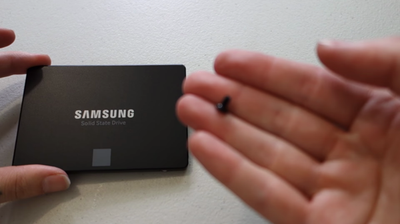
My thoughts on the SAMSUNG 860 QVO 1TB V-NAND SATA SSD (2024)
My thoughts on the SAMSUNG 860 QVO 1TB SSD: speed, durability, capacity, and performance.
Introduction
I recently upgraded my computer with a SAMSUNG 860 QVO 1TB SSD and it has made quite a profound difference in how I use my PC. The new drive replaced an old, sluggish HDD and the boost in performance was immediate. I noticed faster load times, quicker data transfers, and a more responsive system overall. It's like my PC has been given a new lease on life. Although there are some limitations to this SSD, the benefits far outweigh the drawbacks.
Some photos (click to enlarge)
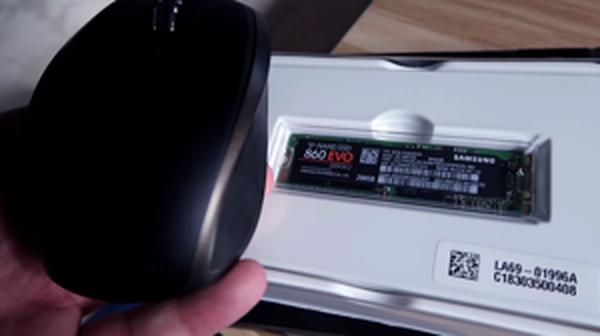
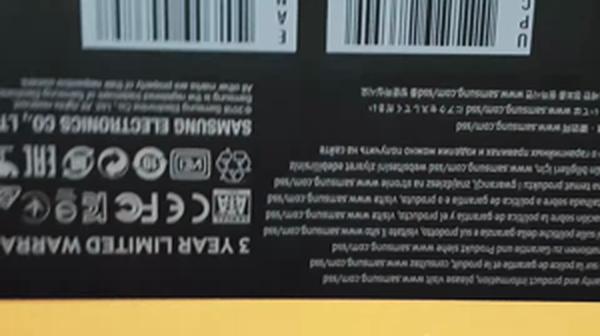
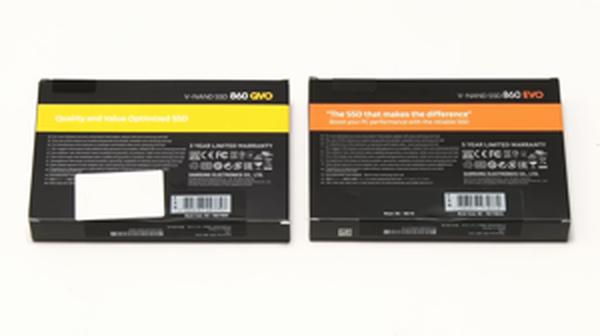
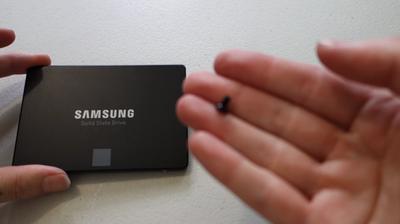
Specs of the SAMSUNG 860 QVO 1TB V-NAND SATA SSD
- Release Year
- Brand
- Color
- Connectivity Technology
- Digital Storage Capacity
- Hard Disk Form Factor
- Hard Disk Description
- Hard Disk Interface
- Installation Type
- Special Feature
Prices
The Impact of Speed on Everyday Computing
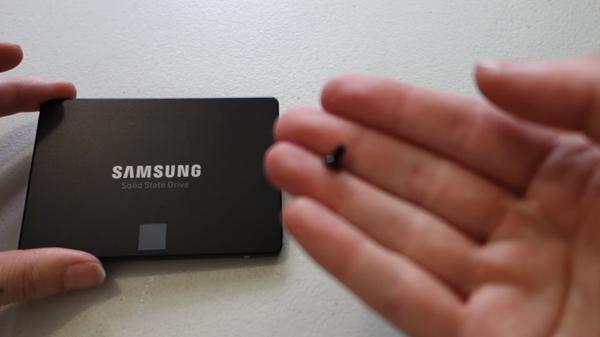
The switch to an SSD, specifically the SAMSUNG 860 QVO 1TB SSD, has left a noticeable impact on the efficiency of my daily computing tasks. Let's break it down:
Boot Time: I shudder thinking about the days when booting up my PC was a coffee-break-long waiting game. Now, it's a blink-and-you'll-miss-it moment.
Application Launch: Photoshop, once a test of patience, now springs to life in seconds rather than minutes.
File Transfers: Moving large files feels like a breeze. I can transfer gigabytes of data while sipping my tea without missing a gulp.
However, it's not a walk in the park for all tasks:
- Large Data Workloads: When I do heavy-lifting with video editing or massive file transfers, I do hit that wall where the speeds throttle back significantly after a certain point.
In daily use, however, these SSD speeds transform my workflow into a smooth ride. I’m doing more in less time, not just because file operations are faster, but because the lack of lag keeps me focused. The responsiveness of my system is so immediate that the clearest drawback seems to be realizing I could have had this level of performance much earlier.
Sure, the world isn't perfect, and like with all tech, there are trade-offs. While I revel in the briskness of the drive's performance for most tasks, the slow-down during extensive data operations can be a damper. It's at moments like this that I'm reminded of the limitations of QLC NAND technology in comparison to its faster siblings like TLC or MLC.
Yet, isn't that always the case? We find the tech that fits our needs and budgets and work within those parameters. For me, the SAMSUNG 860 QVO has been a reliable companion, handling my everyday demands with ease, and only on rare heavy tasks does it remind me of its limits.
Crucially, I didn't break the bank upgrading to this SSD. For regular computing, the 860 QVO provides a bounty of space and pace, and I watch it easily manage anything I throw at it. If you're sitting on the fence wondering if an SSD upgrade is worth it, let me tell you, jumping over to the SSD side makes for a far smoother ride in the computing landscape.
Durability and Reliability of SSDs Over Time

When considering the durability and reliability of SSDs like my SAMSUNG 860 QVO 1TB, I've noticed a couple of points worth mentioning. Here are the key observations that I've made:
SSDs have no moving parts, meaning less wear and tear compared to traditional HDDs.
Data retention can be an issue, as SSDs may lose data if left without power for extended periods. However, this is typically a concern for drives stored for several months or years without use.
The write endurance of SSDs has improved drastically with newer technologies. Even with QLC NAND, such as in the 860 QVO, drives can handle significant amounts of data written over time.
Firmware and software optimizations, including TRIM support and garbage collection, help maintain drive performance.
The heat output is considerably less, which potentially increases the longevity of the drive and the system overall.
Now, I have read that SSDs can degrade over time, but I'm a practical user, not constantly writing and deleting massive files. Even with my daily use, which includes a ton of gaming, the dreaded "write wear" doesn't really scare me. The TBW (total bytes written) ratings on these drives are usually quite high, and the 860 QVO 1TB, for example, is rated for 360TBW. I've seen people crunch the numbers, and it amounts to years of heavy use.
My personal experience has been solid with this SSD. I've admired the quick boot times, the silent operation, and I have yet to encounter any reliability issues. It's like going from a gas-guzzling clunker to a sleek electric car—both will get you from point A to point B, but the experience is night and day.
The major drawback of an SSD, typically, is the cost per gigabyte when compared to HDDs, but prices have been falling, and deals are frequent. Plus, considering how much a slow system can hamper productivity, the price difference becomes negligible.
I've also heard the advice to keep an eye on the SSD's health status with software—Samsung Magician, in this case—and take advantage of features like over-provisioning. This is where a portion of the SSD's capacity is set aside to assist in performance and longevity. That's a great tip I've taken to heart.
In essence, the reliability and durability of modern SSDs, including the 860 QVO 1TB, seem to surpass what I need them for. And if the trend continues, we'll see these drives becoming more resilient and even more cost-effective.
The Value Proposition of Large Capacity SSDs for Gamers

As a gamer who juggles between massive open-world games and high-speed shooters, I've always prioritized performance and storage capacity. With the Samsung 860 QVO SSD, I'm seeing firsthand just how valuable a large-capacity SSD can be, despite some drawbacks.
Here's my personal rundown of why increased SSD storage matters for gamers:
Fast Game Loading: SSDs, particularly with storage sizes like 1TB or 2TB, reduce loading times dramatically. Jumping into a game like "The Witcher 3," the difference is night and day compared to a traditional HDD.
Storage Space for Games: Many modern games easily exceed 50GB. With a 1TB SSD, I'm not forced to constantly uninstall and reinstall games.
Improved System Responsiveness: This isn't just about games. Every task feels snappier, from booting up to launching game clients.
However, cost is a significant consideration. While prices have come down, large-capacity SSDs can still be a big investment. Moreover, for those who are heavy on writing large files frequently, the QLC NAND in the Samsung 860 QVO might not be as enduring as MLC or TLC NAND found in other models.
Also, a mention on performance once the SLC cache is full - it's something to bear in mind as it can slow down considerably. This might not be a frequent issue for everyday gaming, but when it hits, it can be a bottleneck, especially for users who move around huge files or game libraries frequently.
In terms of usability, it was a slight bother to find that the 860 QVO didn't come with cables, and the initial setup with the necessary BIOS tweaks was a bit of a hassle. But once up and running, the difference in system response and game load times makes it worth the initial struggle.
The 3-year warranty offers peace of mind, knowing that I have some backup from Samsung should anything go wrong. The SATA 6 Gb/s Interface came in handy as it was backward compatible with my older hardware that didn't support the newer interfaces.
Overall, for gamers looking to reduce load times and have a plethora of games installed at any one time, SSDs like the Samsung 860 QVO offer a balanced proposition of size, speed, and value. While there are downsides like slower speeds after sustained transfers and potentially less endurance than other SSD types, the impact on gaming is minimal. The pros definitely outweigh the cons for a regular gamer like me.
The Transition from HDD to SSD and Its Overall Effect on System Performance

Making the switch from traditional HDDs to SSDs such as the SAMSUNG 860 QVO 1TB has been a significant upgrade in my daily computing life. The immediate difference in boot-up times and application responsiveness is nothing short of remarkable. Let's break it down:
Faster Boot-up: Going from minutes to mere seconds is a game-changer - something you have to experience to believe.
Quick Application Launch: Those tedious loading times for software and games? Virtually eliminated.
Silent Operation: The absence of moving parts not only reduces noise but also decreases wear and tear.
However, it's not without its drawbacks:
Sustained Transfer Speed: When dealing with large file transfers, the speed can drop off once the cache is full.
Higher Cost Per GB: Generally, SSDs come at a premium compared to their HDD counterparts.
My personal experience with the SAMSUNG 860 QVO has overall been positive. Its terabyte-level storage means I no longer have to juggle data between drives, and the intelligent TurboWrite tech keeps the drive running at peak performance even as files start to fill up. It's true that these benefits come at a higher cost, and I did notice the expected dip in transfer rate with hefty, sustained workloads. But for the average user, these hiccups are barely noticed amidst the overall efficiency gains.
What may be more noticeable is the upfront cost, as SSDs like the QVO command a heftier investment. But considering the peace of mind that comes with a 3-year warranty and secure encryption, it's an investment I find justifiable.
In reflection, the transition to SSD is akin to upgrading from a flip phone to a smartphone—it fundamentally changes the way you interact with technology on a daily basis. The SAMSUNG 860 QVO, despite the occasional speed bump under large file loads, underscores what modern computing has to offer: speed, stability, and sophistication.
As a final note in our journey through "Accelerating Daily Tasks: My Experience with the SAMSUNG 860 QVO 1TB SSD," the move from HDD to SSD is not just about getting tasks done faster. It's about transforming the user experience into something smoother and more enjoyable. The palpable shifts in system performance make for a compelling case to embrace SSD technology, despite the minor drawbacks, for a richer, more efficient computing lifestyle.
Comments (0)
Share